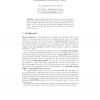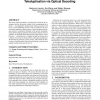2812 search results - page 5 / 563 » Secrecy in Multiagent Systems |
POPL
2000
ACM
13 years 12 months ago
2000
ACM
Systems that authenticate a user based on a shared secret (such as a password or PIN) normally allow anyone to query whether the secret is a given value. For example, an ATM machi...
FSTTCS
2003
Springer
14 years 1 months ago
2003
Springer
Tagging schemes have been used in security protocols to ensure that the analysis of such protocols can work with messages of bounded length. When the set of nonces is bounded, this...
CONCUR
2005
Springer
14 years 1 months ago
2005
Springer
Abstract. We present a discretely timed spi-calculus. A primitive for key compromise allows us to model key compromise attacks, thus going beyond the standard Dolev–Yao attacker ...
CSCW
2012
ACM
12 years 4 months ago
2012
ACM
By examining the information practices of a punk-rock subculture, we investigate the limits of social media systems, particularly limits exposed by practices of secrecy. Looking a...
CCS
2008
ACM
13 years 10 months ago
2008
ACM
The access control provided by a physical lock is based on the assumption that the information content of the corresponding key is private -- that duplication should require eithe...


